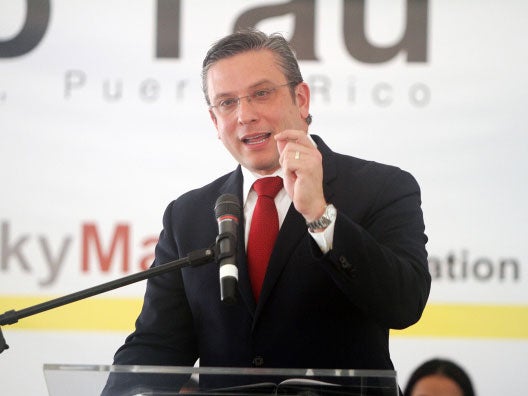Puerto Rico to default on debt payment Monday as financial crisis worsens
With Congress offering no lifeline and residents fleeing in droves, the crisis goes from bad to worse

Puerto Rico was set to miss most of a $433m (£295m) bond payment due on Monday, the latest dire turn in a spiraling debt crisis that has prompted an historic exodus from the island while appeals to the US Congress in Washington for emergency help have gone unheeded.
The default was confirmed by Governor Alejandro Garcia Padilla in a television address on Sunday. He ordered the Government Development Bank to withhold $370m of the payment, saying that essential services for 3.5 million residents would otherwise have to be slashed.
The decision will trigger lawsuits from angry creditors as early as Monday. However, worse is probably still to come. A much larger payment of roughly $1 billion is due on 1 July with little to suggest that the island has the cash to cover it. Altogether Puerto Rico has debt of about $70bn it cannot cover. It also has a staggering $44bn unfunded pension shortfall.
The island, which has a kind of twilight status as a US territory without the rights and protections of any of the 50 states, has been pleading with Washington to come to its assistance. While any kind of outright bailout is probably politically impossible, the US Congress has been under pressure at least to approve the creation of financial oversight body to help restructure its debt.
So far even that has proved too great a leap for Congress, which failed to agree even the outlines of such a deal before going into a week-long recess last Friday. Democrats are nervous that an all-powerful oversight body would run roughshod over union rights on the island while Republicans are allergic to anything that has even the merest whiff of a bailout.
The crisis, which has been brewing for over a year now, is also rekindling debate on the island about resolving its limbo status, either seeking full independence or asking for full state-hood.
At its root is a recession that is now a decade old. In addition to suffering the global effects of the 2008 crash, Puerto Rico was also shellacked when Congress removed tax breaks that had spurred a boom of manufacturing, notably in pharmaceuticals. Many of those mainland-based companies closed shop on the island once those benefits were withdrawn.
As conditions worsened, residents also began to flee for the US mainland in ever growing numbers - Puerto Ricans have full US nationality - an exodus which only served to worsen the economic crisis by eroding the government’s tax revenues further. By the latest estimates, for example, Puerto Rico is losing an average of one doctor a day. The latest statistics show that 84,000 people - 230 a day - abandoned their homes on the island during 2014 alone.
“This was a painful decision. We would have preferred to have had a legal framework to restructure our debts in an orderly manner,” the Governor conceded. “But faced with the inability to meet the demands of our creditors and the needs of our people, I had to make a choice. I decided that essential services for the 3.5 million American citizens in Puerto Rico came first.”
The immediate impact on world bond markets of Monday’s default was expected to be muted. Most mutual funds in the US have already rid themselves of Puerto Rico debt. However, the missed payment will make it still harder for the island to access to capital markets, which in turn is likely to exacerbate its difficulties ahead of the 1 July payment date.
Governor Garcia Padilla is in a squeeze because the only realistic way of finding the missing money would be drastically to cut spending on big-ticket items like schools and hospitals. But hurting the residents of the island would only fuel their desire to leave.
“We will continue working to try to reach a consensual solution with our creditors,” he said. “That is one of our commitments. But what we will never do is put the lives and safety of our people in danger.”
Join our commenting forum
Join thought-provoking conversations, follow other Independent readers and see their replies
Comments